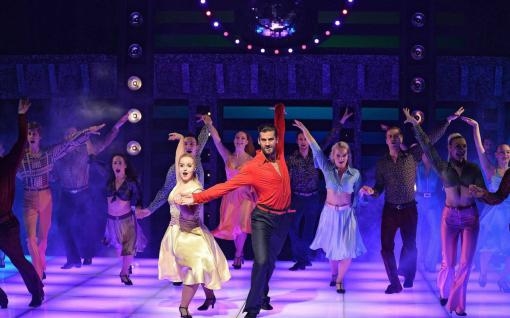Hits like Stayin’ Alive, Night Fever or How Deep Is Your Love sung beautifully, and wonderfully constructed and danced choreography in shiny disco costumes, and three exceptional performances in the main roles. That is the currency of the new Brno musical Saturday Night Fever. The director Stanislav Moša staged it in the Municipal Theatre.
The theatre version of the film Saturday Night Fever, which became famous in 1977 for the dance numbers of John Travolta and the hits of the sibling group the Bee Gees, also tells the story of the youngster from Brooklyn, Tony Maner. This teenager’s only interest is to spend the weekend at the discotheque - using Saturday dances, drugs and sex to forget the drudgery of life. The theatre adaptation of the film had its premiere in London in 1998, followed by productions on Broadway and in Prague’s Kalich Theatre in 2014 among others.
Already last year in the summer Moša prepared an open-air version of this disco musical at Switzerland’s Walensee Lake, which however was, in terms of musicians, of a more chamber character. There were seven people playing in the place of a thirty-member orchestra. But back to Brno … The local excellent sounding version opens a window (in the form of a video projection) on the complicated social-economic-political context underlying the apparently carefree tale set in the United States in the 1970s. A time when the hard dollar softened, and certainties were lost … Carter’s speech on a crisis of confidence alternates with a slide show of significant events, which cast doubt on the stability of this decade in the USA …
Even despite this deeper image the Brno production of the musical is not analytical or journalistic musical theatre. It is in particular about the love, family and work problems of the central hero in this somewhat shallow tale. But here this is primarily about dance, disco music and songs, which this production offers to a large degree, and does not play on deep-thinking social inquiry. The director does not go for any pointless modernisation. And another of the benefits of Moša’s production is the minutely simulated atmosphere of the America of the seventies or – if you like – the theatrically materialised times when people moved to the rhythm of disco on the dance floor. What more could one want from a musical?
However this musical in Brno does not completely give up on the communication of certain messages. One of these could be the successful set by Christoph Weyers, who framed the stage outside with the huge bridge leading from Brooklyn to Manhattan. This bridge appears on the stage. It is not only a link between two worlds; it is a transition that symbolises the hero's journey into adulthood, and is also is the backdrop for the tragic suicide of his friend. The costumes by Andrea Kučerová are also successful, which work with the ambivalence of settled normal fashion and shiny sexy outfits, in which young people experience their Saturday night fever.
Among the other positives of Moša’s production is the choreography by Igor Barberić, which especially in the ensemble scenes did not content itself with mere dusted-off disco dances. Barberić’s choreography has an original style, which holds the production together, it is both imaginative and modern though it works with references to the past and also uses the classic Latin American dances. However what is essential is a bravura performance of the choreographer’s vision, which the whole company, including the soloists, manage faultlessly.
And there are also the solo numbers which at the first premiere (the remaining cast have my apologies) made of the evening truly an experience. The uncrowned king of the performance was Kristian Pekar in the main role of Tony Maner. Aside from his dancing and vocal virtuosity, what was of great value in this role was his grasp of the acting. Here you do not have a cheap imitation of the iconic Travolta, who constantly adjusts his gelled hair. Pekar found his own extremely compelling expression, giving one of his best performances here. When Pekar is on stage it is simply impossible to believe that Saturday Night Fever was not written specifically for him.
Other great performance on the evening came from the women. Viktórie Matušovová in the role of the disco queen Gloria with her masterful singing earned her applause in the opening scene. With this power you already look forward to each further entrance of the young actress in this demanding vocal part. Dagmar Křížová made her solo musical number as Annette an experience. Her entrance was an example of great singing with thoughtful and structured dosing of emotions. All the songs are so eloquent that the producers are to be praised for leaving them in in the original English version and without a slavish Czech translation. You will enjoy these songs in their original form even if you do not speak English. It is thus easy to understand how and why this rather thin plot works. Concerning Moša’s production as a whole one can only add: in this packaging disco and the musical can be recommended.
































No comment added yet..